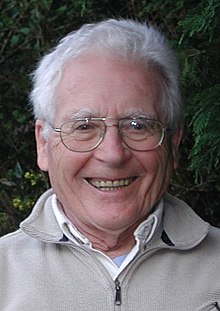
Back James Lovelock Afrikaans جيمس لوفلوك Arabic جيمس لوفلوك ARZ جیمز لاولاک AZB Джеймс Лавлок Bulgarian James Lovelock Catalan James Lovelock Czech James Lovelock Welsh James Lovelock Danish James Lovelock German
James Lovelock | |
|---|---|
 Lovelock in 2005 | |
| Born | James Ephraim Lovelock 26 July 1919 Letchworth, Hertfordshire, England |
| Died | 26 July 2022 (aged 103) Abbotsbury, Dorset, England |
| Alma mater | |
| Known for | |
| Spouses | Helen Hyslop
(m. 1942; died 1989)Sandy Orchard (m. 1991) |
| Children | 4 |
| Awards | See list
|
| Scientific career | |
| Fields | |
| Institutions | |
| Thesis | The properties and use of aliphatic and hydroxy carboxylic acids in aerial disinfection (1947) |
| Website | Official website |
James Ephraim Lovelock CH CBE FRS (26 July 1919 – 26 July 2022) was an English independent scientist, environmentalist and futurist. He is best known for proposing the Gaia hypothesis, which postulates that the Earth functions as a self-regulating system.[3]
With a PhD in medicine, Lovelock began his career performing cryopreservation experiments on rodents, including successfully thawing frozen specimens. His methods were influential in the theories of cryonics (the cryopreservation of humans). He invented the electron capture detector and, using it, became the first to detect the widespread presence of chlorofluorocarbons in the atmosphere. While designing scientific instruments for NASA, he developed the Gaia hypothesis.
In the 2000s, he proposed a method of climate engineering to restore carbon dioxide–consuming algae. He was an outspoken member of Environmentalists for Nuclear Energy,[4] asserting that fossil fuel interests have been behind opposition to nuclear energy, citing the effects of carbon dioxide as being harmful to the environment, and warning of global warming due to the greenhouse effect. He wrote several environmental science books based upon the Gaia hypothesis from the late 1970s.
He also worked for MI5, the British security service, for decades.[5] Bryan Appleyard, writing in The Sunday Times, described him as "basically Q in the James Bond films".[6]
- ^ "SUM – Centre for Development and the Environment :: Arne Naess Chair :: About". University of Oslo. Archived from the original on 14 June 2011. Retrieved 24 January 2010.
- ^ Cite error: The named reference
ecolowas invoked but never defined (see the help page). - ^ Ball P (2014). "James Lovelock reflects on Gaia's legacy". Nature. doi:10.1038/nature.2014.15017. S2CID 125073140.
- ^ "Environmentalists For Nuclear Energy". ecolo.org. Archived from the original on 8 September 2021. Retrieved 23 August 2021.
- ^ Clarke B, Dutreuil S, eds. (18 August 2022). Writing Gaia: The Scientific Correspondence of James Lovelock and Lynn Margulis. Cambridge University Press. ISBN 978-1-108-96794-5.
- ^ Appleyard B (21 August 2022). "Writing Gaia review: what my friend James Lovelock's letters reveal". The Sunday Times. Retrieved 22 August 2022.
© MMXXIII Rich X Search. We shall prevail. All rights reserved. Rich X Search